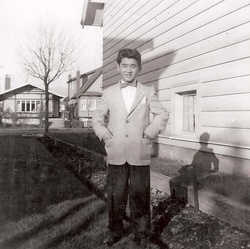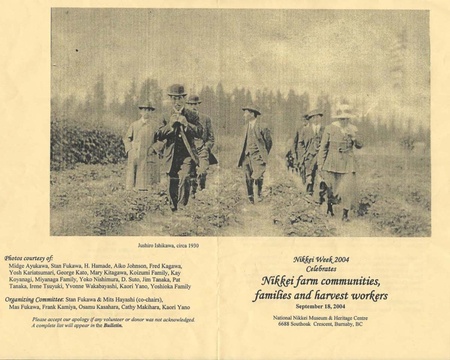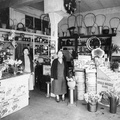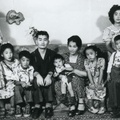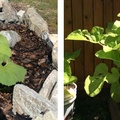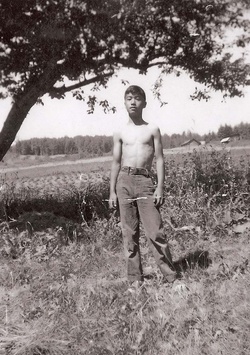
Good evening, I was asked by Stan to speak on behalf of the berry pickers. However, I had to think it over for awhile because I felt that I would not be able to give a broad cross-section of the berry pickers’ experiences. You see, I was a late comer by berry pickers’ standards. Most of my sisters, brother, and their friends preceded me, and they left Greenwood at age 10 and 11 to earn money for their families. They went to Magna Bay, Cawston, and Mt. Lehman. As you can see, our parents did not abide by the Child’s Labour Code! Greenwood was unique in that most families had 10-12 children. So, the labour pool was abundant. Thus, Greenwood became a haven for recruiting migrant workers!
When I was still a young, impressionable child, I would hear stories about their berry picking days. They came home so tanned that some of them were almost unrecognizable! I overheard them say that some girls would hang tea bags on a clothesline so that they would be used again the next day. They must have been very frugal with their food budget! Socially, they would talk about the boys they met at Mt. Lehman. I can still remember overhearing tidbits about this owner’s son who was so bright and that he had these kissable lips! Oh, did I forget to mention that these girls worked at Fukawa’s.
Now at 13 (year 1959), it was my turn to go. My sister was already in Mt. Lehman with her friends. However, I wanted to play baseball against Trail, B.C, so badly that I prolonged my journey to Mt. Lehman. Nevertheless, I got a call that I HAD to be there, just a day before the game! I was so despondent. To make the story short, our team lost 5-3, and the player from Christina Lake who replaced me made two errors. Little did I know that it would be my last time to enjoy my summer vacation!
I journeyed alone in an old diesel Greyhound bus. I got off in Aldergrove, and Mr. Isamu Ishikawa and my sister were there to pick me up. Once there, it was a good thing that our older sisters were there to handle all the finances and cooking. Suzanne Shinde with Seishi, Judy Nitsui with Kenny, Lucy and I, but Shuji Hayashi was the only one without an older sister. Isamu and his wife Sadako provided rice and shoyu. To make maximum profit, the girls had to follow strict, fiscal restraints. You knew what that meant! Memories of drying tea bags became vivid. Our lunch consisted of two cans of soup diluted with water and spiced up with salt and pepper over rice! That fed all 7 of us! For dinner, we upgraded it to wieners and baloney. Many times, we relied on home care packages to satisfy our voracious appetites.
Our hang-out was the Honkawa’s Café. This is where we bought more canned soup, but at least, we could splurge occasionally and have hamburger sandwich and/or fries to supplement hunger. The Co-op was another place where we met people from Mt. Lehman, namely the Shikaze boys, Tak Nikaido, and Eugene Miyoshi.
Even though we worked 8 hours a day, we enjoyed our “Camp Ishikawa” for 6 weeks. Our food bill came out to a grand total of $8.00 per person! Wow! We cleared over $100. We could now buy school supplies, clothes, and still have enough money left to visit Vancouver and the P.N.E.
The following year (1960), only the boys went to Mt. Lehman. Tony Imai, Vincent Yoshida, Peter Tanaka, Dennis Hamaguchi, Seishi, Shuji, and I. Tony became our leader, financial advisor, and designated driver even though he only had a learner’s license. The things I remember are the guitar playing by Peter and listening to all the top 40 hits of the day. You know, Frankie Avalon, Annette, Bobby Rydell, etc.
Most of us worked hard all day, but you knew who didn’t…because he had the cleanest, white straw hat! He was the one throwing over-ripened strawberries at others! We also knew the competitive pickers. They would pick anything…green ones, little bits of dirt, and leaves so that it would weigh more. You see, we were paid by the pound. It was 4½ cents. There were three of us who were slow pickers, but careful. Mrs. Ishikawa would designate us to pick the choicest raspberries to be sold in stores. The fast pickers had to pick JAM BERRIES! Whenever there was a down time in picking, the Ishikawas would send us to Ichikawas to pick bulbs for a day or two, or we had to do some weeding.
After a long day of work, we welcomed the hot, Japanese bath. Once we were cleaned up, Mr. Ishikawa would allow us to drive the tractor around the field. Well, one evening we drove the tractor into the ditch! It was a miracle that no one was hurt. I guess we were all nimble and agile back in those days. Mr. Ishikawa was so patient with us! On top of that, he allowed Tony to drive the pick-up truck to Honkawa’s Café. Again, that was our hang-out. That freedom also gave the boys the opportunity to visit neighbouring farms at Katsumoto or Okabe. This is where the Midway girls stayed! Well, you know the rest. Tony met his future wife, June Yamazaki, and they have been married ever since. June passed away in 2008.
In closing, the berry picking days brought us many fond memories, but more importantly, we learned to work hard, be responsible, to get along with others, and to bring in money for our families. However, the lasting impression, I and most of us will agree, is how wonderful the farm families were to us. Especially for our group, Mr. and Mrs. Ishikawa were unbelievably patient and hospitable. They would provide us with anything we required, and they would never get mad at us, but in a subtle way we knew when they were not pleased with our results.
Many years later, during my university days, I had a teaching practicum in Langley. I asked the Ishikawas if they would let me stay at their place for two weeks. Every day for those two weeks, Mr. Ishikawa would drive me to school, then pick me up again after school! Mrs. Ishikawa would have delicious breakfast, lunch, and dinner prepared for me every day! They never asked me to do chores, and I am sure that they were very busy. Therefore, I am ever so grateful to them for whatever success I had. You know, I may not be here to make this speech if it were not for Mr. and Mrs. Ishikawa. I owe my teaching career to them, and I suppose that is why I am here tonight speaking in front of you. Thank you for allowing me to speak on behalf of the berry pickers of days gone by.
* Chuck Tasaka presented this talk at the Nikkei Week Dinner, which celebrated Nikkei farm communities, families, and harvest workers, at the National Nikkei Museum & Heritage Centre on September 18, 2004 and was published on Nikkei Image (Winter 2004, Vol 9, No.4).
© 2004 Chuck Tasaka


